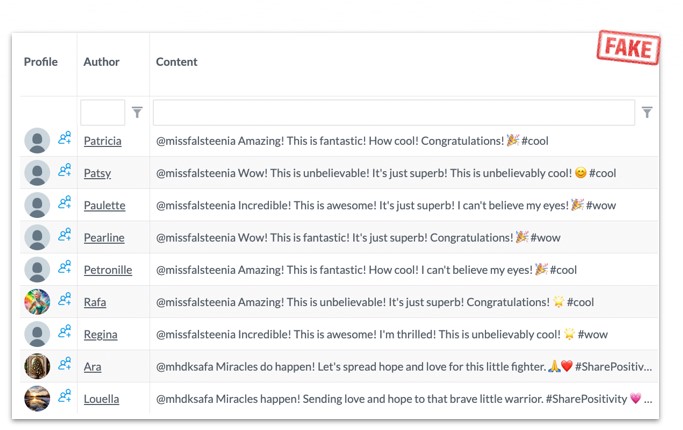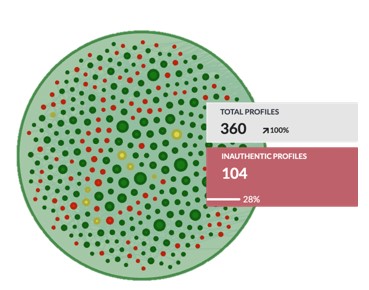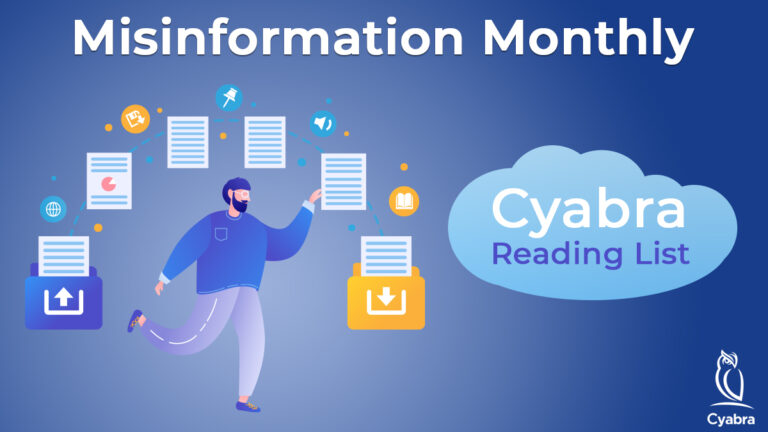2024 is the biggest election year in history. 4 billion people, more than 40% of the world’s population, will be casting their votes. How would they choose who to vote for? Probably not by following news or traditional media: latest research has shown that more and more people, especially younger generations, look to social media as their main source of news.
With the availability and accessibility of social media, it should come as no surprise that influencers play a huge role in shaping our views – not only regarding elections and other societal topics, but on any topic that we think of as interesting or important.
But what happens when those influencers spread messages that sow confusion and mistrust, and what role do fake profiles play in amplifying those influencers’ content?
TL;DR?
- During February, Cyabra scanned some of the most prominent influencers on X (Twitter). On average, 25% of those influencers’ followers were fake.
- Fake profiles and bots were particularly gathered around negative influencers who spread anti-western and anti-democratic narratives.
- The fake profiles were amplifying the negative content and actively supporting it. Some were using identical supportive messages.
Over the span of one month, Cyabra has analyzed some of the most prominent influencers on X (Twitter), including Jackson Hinkle, Muhammad Smiry, Motaz Azaiza, Dr. Anastasia Maria Loupis, Mohamad Safa, and others. The analysis has uncovered coordinated fake campaigns designed to amplify negative content posted by those influencers.
On average, 25% of the profiles following and interacting with those influencers were fake. A significant portion of those fake profiles were created in the last four months, between October 2023 and January 2024.
Cyabra’s research also uncovered that the fake profiles were actively interacting with one another on different influencers’ pages, responding and posting strategically to boost the visibility of the influencers’ posts. Following other fake profiles and interacting with them helped achieve credibility and gain exposure, despite the fact that those fake profiles endlessly repeated the same identical messages (and even used identical emojis) across different posts.

These fake profiles, which are still active on X at the time of writing this article, are not just people hiding behind anonymous identities. This is a coordinated bot campaign, organized with a definitive intent. In an election year, it’s more important than ever to ask – who gains from fake profiles spreading negative and controversial messages, and what can we do about it?

The Adoring Fake Fans of Jackson Hinkle
During October 2023, influencer Jackson Hinkle experienced a rapid and unusual rise in popularity, becoming the most viral influencer on X, with growth of approximately 1.2 million followers within a span of 19 days. By November 7th, Hinkle had reached 2 million followers. Most of the rise can be attributed to controversial content posted by Hinkle.
Cyabra’s analysis uncovered that 40.5% of Hinkle’s current followers are fake.


During February, 17% of the profiles that interacted with Hinkle’s posts were fake. An even higher percentage of bots, 25%, interacted with influencer Motaz Azaiza. Those fake profiles were also amplifying Azaiza’s posts in Arabic, and managed to create connections with a wide audience of authentic profiles.

Similar percentage of fake profiles were identified interacting with influencers Mohamad Safa (23% fake), and Missfalasteenia (32% fake). Here, again, many of the fake profiles that followed those influencers were linked, mutually following other fake profiles and responding regularly to each other’s content.
Bots, Why Are You So Negative?!
Generally, fake profiles and bots latch onto controversial topics. Hinkle, in particular, is known as a polarizing figure. He regularly speaks about his support of Russia, China and Iran, as well as groups labeled as terrorist organizations by the United States, such as the Houthis and Hamas. In July 2023, during an interview with Piers Morgan, Hinkle described Vladimir Putin as a “proponent of peace” who is trying to combat the “Nazi regime” in Ukraine. Hinkle also frequently participates in interviews with Russian media outlets.
By continuously amplifying Hinkle’s posts, bots leverage his provocative and divisive content to spread fake news and sow feelings of confusion, mistrust, frustration and anger. Due to the efforts of those bot networks and the bad actors behind them, hundreds of millions of people have been exposed to Hinkle’s posts and to other negative influencers.
If we were to return to our first point – with so many people casting their votes this year, and with so many people using social media as their main source of information, the real effect of bots and fake profiles on social media is too enormous to measure. Social media discourse has become untrustworthy. While Cyabra regularly advises that people practice caution and healthy skepticism, double check every post and look out for content that appears intentionally negative, the fact is, as a society, we cannot continue to expect the general public to independently navigate this ever-growing storm of disinformation, misinformation, and fake news. Governments must protect the public by utilizing better tools, capable of identifying and taking down fake profiles.
Help Cyabra keep social media safer and more authentic.


